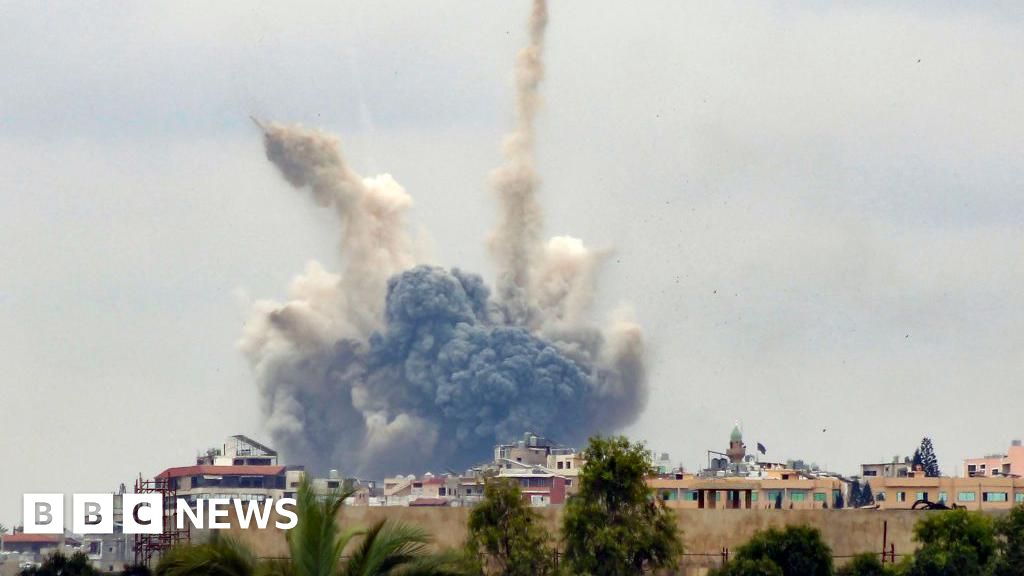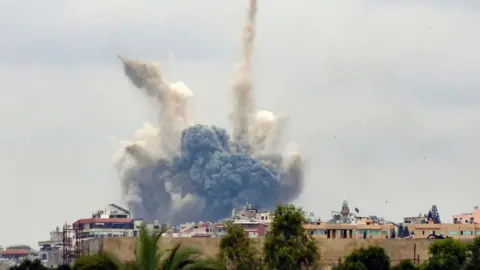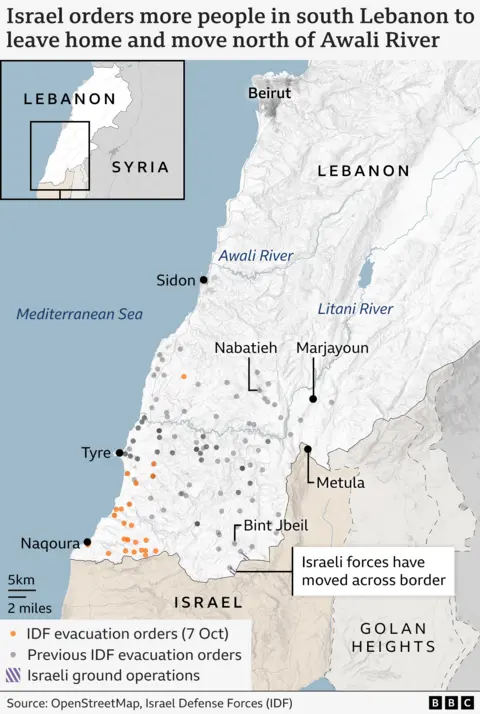Israeli strike kills 10 firefighters in Lebanon, At least 10 firefighters have been killed in an Israeli air strike in a border area in southern Lebanon, the Lebanese health ministry says. A statement said the firefighters had been “ready to go out on rescue missions” from a municipal building in Baraachit when it was struck overnight. There was no immediate comment from the Israeli military, but it said overnight that fighter jets had struck targets belonging to the armed group Hezbollah in southern Lebanon.
On Monday afternoon, the Israeli military said it had carried out air strikes on 120 targets in southern Lebanon in only an hour, after Lebanese media reported intense Israeli bombardment across the region.
Events That Sparked New Tensions in the Middle East
A reported Israeli airstrike that killed 10 firefighters in Lebanon has raised serious concerns about escalating tensions in the Middle East. The incident has exacerbated the already tense situation between Israel and its neighbors, especially Lebanon, which has long been the scene of clashes and conflicts. The action has not only added to the death toll, but has also strained diplomatic relations and deepened anti-Israel sentiment in Lebanon and beyond.
The attack on firefighters, who are generally considered neutral and tasked with protecting civilian life, raises serious questions about the ethics of warfare. Such an action could be considered a violation of international law, including the Geneva Conventions that emphasize the protection of non-combat personnel, especially those who are trying to save lives. If it is proven that the firefighters were killed in a deliberate attack, it could provoke a strong reaction from the international community.
The state-run National News Agency said Israeli aircraft hit more than 30 towns and villages around the southern coastal city of Tyre alone.
The BBC’s Orla Guerin, who is in Tyre, said some of the locations hit were in the hills close to the border with Israel, but that at least one struck a built-up area of the city.
The Israel Defense Forces (IDF) said the targets of the strikes belonged to three regional units of Hezbollah’s Southern Front – the elite Radwan Force, the Missiles and Rockets Force, and the Intelligence Directorate.
Humanitarian and Crisis Impacts for Lebanon
Furthermore, from a humanitarian perspective, this attack is deeply disturbing. Firefighters in Lebanon, as in any country, play a crucial role in maintaining public safety, especially in areas that are at risk of fire due to attacks and armed conflict. The deaths of 10 firefighters are not only a great loss to the local community, but also undermine Lebanon’s ability to respond to future emergencies. Lebanon’s emergency infrastructure is already heavily burdened by the ongoing conflict, and an incident like this could undermine recovery efforts and exacerbate civilian suffering.
For the Lebanese people, this attack has added to the trauma they already feel from the ongoing conflict. As a country that has experienced multiple wars and foreign interventions, this incident is a stark reminder of the fragility of security in the region and the negative impacts of ongoing regional conflicts.
The IDF also said it conducted a “targeted” strike in Beirut’s southern suburbs, where a thick plume of smoke was reported.
The Israeli invasion of southern Lebanon also appeared to be expanding, with the IDF saying that a third division had joined the ground operation it launched six days ago to dismantle Hezbollah infrastructure near the border.
The IDF also ordered the evacuation of another 20 communities in the south, including the coastal town of Naqoura where the UN peacekeepers in Lebanon have their headquarters.
Three weeks of intense Israeli strikes and other attacks in Lebanon have killed more than 1,400 people, including 22 on Sunday, and displaced another 1.2 million, according to Lebanese authorities.
Hezbollah – a Shia Islamist political, military and social organisation that wields considerable power in Lebanon – has remained defiant despite suffering a series of devastating blows in recent weeks, including the killing of its leader and most of its top military commanders.
On Monday, the group insisted it was “confident… in the ability of our resistance to oppose the Israeli aggression”.
It came hours after Hezbollah rockets struck the northern Israeli port city of Haifa and the town of Tiberias, causing damage and nine injuries.
Another 135 rockets were fired from Lebanon into Israel on Monday, according to the IDF. Police said a road was damaged in the Lower Galilee region between Haifa and Tiberias.
Israel’s government – which designates Hezbollah as a terrorist organisation – has pledged to make it safe for tens of thousands of displaced residents to return to their homes near the Lebanese border after a year of cross-border fighting sparked by the Gaza war.
The hostilities have escalated steadily since Hezbollah began firing rockets into northern Israel in support of Palestinians on 8 October 2023, the day after its ally Hamas’s deadly attack on southern Israel.
Israel’s Prime Minister Benjamin Netanyahu told a cabinet meeting on Monday that the “counterattack on our enemies in Iran’s axis of evil is necessary for securing our future and ensuring our security”.
International Reaction and Diplomatic Efforts
The attack is likely to provoke a strong reaction from the international community, especially from those who have long been critical of Israel’s military policies in the region. Arab and Muslim countries, which have emotional and historical ties to Lebanon, will likely condemn the attack as an act of aggression. Human rights organizations will also likely demand an independent investigation into the incident to determine whether any violations of international law occurred.
On the other hand, however, Israel could argue that the attack was part of its efforts to protect national security, given the frequent tensions between Israel and militant groups in Lebanon, such as Hezbollah. Israel has long been embroiled in a conflict with Hezbollah, which operates from Lebanon and frequently launches rocket attacks into Israeli territory. However, attacks on non-combat personnel such as firefighters pose significant ethical dilemmas.
The Complexity of the Israel-Lebanon Conflict
The conflict between Israel and Lebanon, which is largely rooted in tensions with Hezbollah, has been going on for decades. Hezbollah, backed by Iran, has been involved in frequent armed clashes with Israel, especially along Lebanon’s southern border. Israel has repeatedly accused Hezbollah of using civilian infrastructure as a cover for military activity, which could be one reason for these attacks. However, these actions have also often drawn criticism due to the high number of civilian casualties in Israeli military operations.
Lebanon itself is in a very vulnerable situation. The country is experiencing a severe economic crisis, political instability, and social tensions caused by a variety of factors, including the influence of external powers such as Iran and Syria. This Israeli attack will only worsen these conditions, increasing the potential for an escalation of conflict in an already fragile region.
Long-Term Impact on Israel-Lebanon Relations
In the long term, this incident could further widen the gap between Israel and Lebanon. Attacks targeting non-military personnel will fuel anti-Israel sentiment among Lebanese citizens, especially those who already feel marginalized and oppressed by Israel’s military presence on the border. It could also increase support for militant groups such as Hezbollah, which often exploits such incidents to strengthen its position as the protector of the Lebanese people from Israeli aggression.
On the other hand, Israel is likely to continue its military policy, which prioritizes preemptive strikes to crush the threat posed by Hezbollah. In Israel’s view, decisive military action is the only way to ensure the security of its borders from rockets and terrorist attacks. However, this policy carries significant risks in terms of international relations and increased casualties of innocent civilians.
The Need for Diplomatic and Humanitarian Solutions
While Israel and Lebanon have historically had a tense relationship, incidents such as these highlight the urgent need for a broader diplomatic solution in the region. Peace talks, involving regional powers such as Iran, Syria, and Western allies, may be the only way to de-escalate the military and prevent further casualties, especially among civilians and humanitarian workers. International sanctions or diplomatic pressure on both sides may be needed to force them back to the negotiating table.


